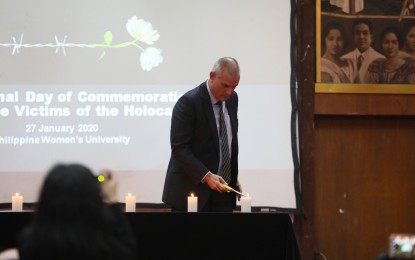
REMEMBERING HOLOCAUST. Israel Ambassador to the Philippines Rafael Harpaz lights a candle in a ceremony commemorating the victims of the Holocaust at the Philippine Women's University in Manila on Monday (Jan. 27, 2020). The event marks the International Holocaust Remembrance Day and the 75th anniversary since the liberation of the Auschwitz-Birkenau concentration camp. (PNA photo by Avito Dalan)
MANILA -- The Holocaust saw the climax of hatred against mankind when the Nazis assumed the power to decide who is worthy to live and who is not.
Around six million Jews were persecuted and murdered during that dark period of World War II. With the decreasing number of Holocaust survivors, there would be few to tell the evils committed against its victims.
The only way to avoid a repeat is for the world to remember and keep their memories alive.
"I strongly believe that in order to prevent atrocities such as the Holocaust, the lessons should be learned, this is very important. Some leaders are denying the Holocaust even, with the fake news and others, we need to tell the story to show the importance of remembering," Israel Ambassador to the Philippines Rafael Harpaz said during the International Holocaust Remembrance Day in Manila.
In commemorating the liberation of Jews from the Auschwitz-Birkenau concentration camp 75 years ago, the Israel Embassy in Manila on Monday led activities such as screening the Holocaust film "The Testament" at the Philippine Women's University where several members of the diplomatic corps in the Philippines were present.
The theme for Holocaust education and remembrance in 2020 is "75 years after Auschwitz - Holocaust Education and Remembrance for Global Justice".
"In the last few years, we have witnessed a rise in antisemitism in many parts of the world, especially in some of the biggest democracies in the western world. This is in addition to a very strong antisemitism trend in some of the Muslim countries including leaders of major Muslim states," he said.
Russian Ambassador to Manila Igor Khovaev, one of the envoys present during the event, echoed Harpaz's statement, and underscored the need to remember the Holocaust as the world's "common pain and tragedy".
"As a representative of the country who made a major contribution to the defeat of Nazi Germany, who lost so many lives in order to liberate Europe from fascists and Nazis, I'd like to emphasize that all of us should remember the history," Khovaev told reporters in an interview.
He said that it is everyone's "common duty" to do the best in order to prevent such tragedy in the future.
Rise vs. antisemitism
United Nations Secretary-General António Guterres has recently noted that the resurgence of hatred, from violent extremism to attacks on places of worship, "shows that antisemitism, other forms of religious bigotry, racism and prejudice are still very much alive".
To combat this, the resolve to fight such acts as well as keeping the truth alive "must persist", he said.
The Council of European Bishops' Conferences (CCEE), for its part, appealed to the modern world for peace and respect for each nation’s right to exist and freedom.
"This appeal is extremely important now, for – despite the dramatic experience of the past – the world in which we live is still exposed to new threats and new manifestations of violence. Cruel wars, genocide, persecution, and different forms of fanaticism are still taking place, although history teaches us that violence never leads to peace but, on the contrary, breeds more violence and death,” its statement forwarded by the Embassy of Poland in Manila read.
In the concentration camp Auschwitz-Birkenau, over a million Jews and several thousand prisoners of other nationalities were murdered, making the area the largest site of mass genocide in the world.
On the 27th of January 1945, the Red Army of the Soviet Union liberated the Auschwitz-Birkenau concentration and extermination camp, signaling the Nazi regime's fall. The genocide, to this day, is remembered as one of the darkest periods in world history. (PNA)
